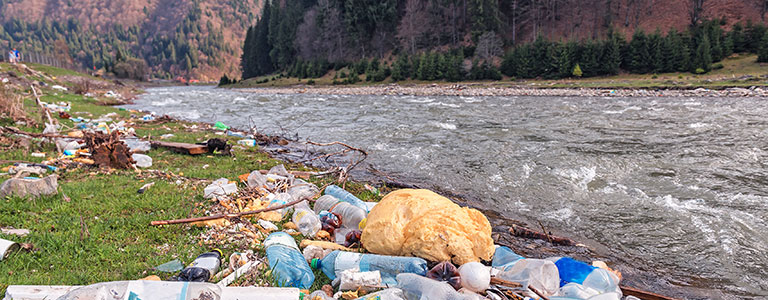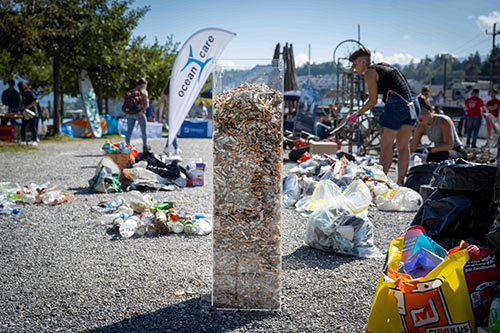STOP UNNECESSARY SINGLE-USE PLASTICS Sign petition now!
Our nature is not a waste dump!
Stop unnecessary single-use plastics.
Switzerland has a plastic problem: Swiss consume an average of 127 kg of plastic per person annually. That’s almost three times the world average.
Therefore we are calling for a stop to unnecessary single-use plastics!
We appeal to the Federal government to apply the Environmental Protection Act consistently: Unnecessary single-use plastic items such as takeaway packaging, plastic bags and microbeads in care and cosmetic products must be banned in Switzerland.

consumes every person in Switzerland.
end up in the Swiss environment.
enter the ocean via Swiss rivers.
is incinerated in Switzerland. Only about 10-15% is recycled or reused.
SUPPORT OUR CALL FOR ACTION
WITH YOUR SIGNATURE

Please sign this petition, even if you live outside of Switzerland.
Each signature counts!
TOGETHER AGAINST THE PLASTIC FLOOD
Support our call with your signature
Switzerland can easily do without unnecessary single-use plastics such as take-away packaging, plastic bags and microbeads in personal care products!
Swiss consume an average of 127 kg of plastic per person annually. That’s almost three times the world average. 85-90 % of these plastics in Switzerland are incinerated after only a short period of use and are not recycled, let alone reused. Compared to the actions taken on banning single-use plastics in the EU, Switzerland is lagging far behind. This needs to be changed.
Considering that,
- An increasing share of our throw-away plastic consists of take-away packaging and items which are practically impossible to recycle and therefore end up incinerated – which is far less clean than often claimed – or littered into the environment;
- Single-use plastic bags remain omnipresent in Switzerland. Notwithstanding reductions, we still use tens of millions of plastic bags per year;
- Indisputable evidence shows the long-term harm caused by microbeads added to cosmetic and personal care products continuously leaking out into the environment,
we call on Swiss authorities to finally take decisive action.
In each of these cases, federal authorities have the authority and discretionary power to take measures to prohibit the use of these superfluous, unnecessary plastics. It is time for the government to assume its responsibility.
Support our call with your signature
While the Swiss government is proactive within international fora to address plastic pollution, we call on the Swiss federal government to be consistent in its policy and act on national level, too. Stop shifting away your responsibility, but apply the instruments already in place within the Environmental Protection Act! Under this law, the Federal Council can ban the single-use plastic items, such as take-away items and plastic bags from the Swiss territory, independent of the material used, and can stop the sale of cosmetic and personal products containing microbeads in Switzerland. We call upon the government to do so.

FACTS ABOUT PLASTIC POLLUTION IN SWITZERLAND
«Deplasticize» Switzerland!

How bad is the plastic situation in Switzerland? What leeway does Swiss legislation allow to stem the tide of plastic? What can and must the Swiss government do? Find out more here. Thank you for signing the petition and also motivating people around you to do so.
- 14,000 tons of macro- and microplastics end up in the Swiss environment every year. Most of this comes from tyre abrasion (8,900 tonnes) followed by littering (2,700 tonnes).
- Littering is not just a water problem. According to the Swiss Federal Laboratories for Materials Science and Technology, 100 tonnes of macroplastics are emitted to waters each year in Switzerland, compared to 4,400 tonnes deposited to soils.
- A 2013 study of Swiss lakes found microplastics in almost every sample.
- About 55 tonnes of plastic enter Lake Geneva every year. A large part of this in the form of microplastics. This adds up 580 tonnes already accumulated in the lake.
- In the Rhine at Basel, an average of 238,887 microplastic particles per km2 have been measured, and the Rhône is estimated to transports an estimated 10 kg of microplastics to France every day.
- An estimated 53 tons of microplastics have by now accumulated in floodplains in Swiss nature reserves.
- Considerable amounts of microplastics have been detected in the snow of the Alps as well as remote mountain lakes.
